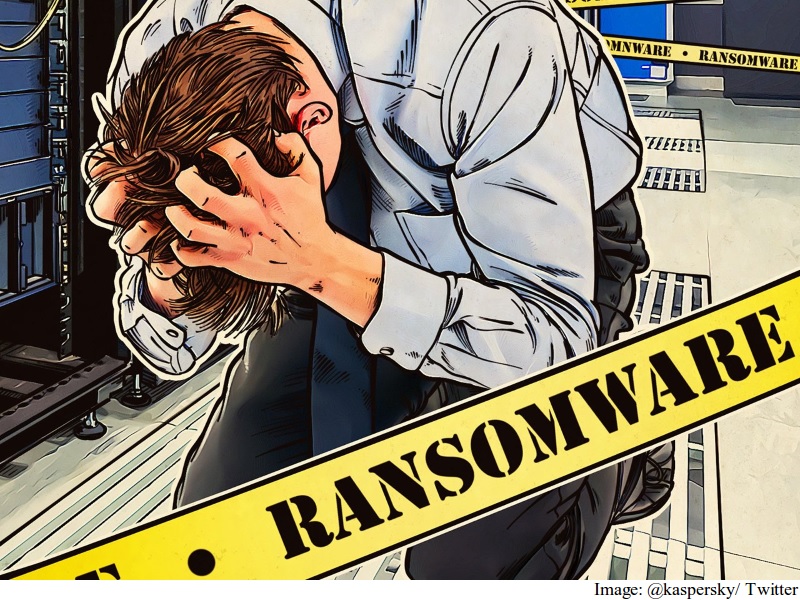- Home
- Mobiles
- Mobiles News
- Mobile Ransomware Attacks Have 'Skyrocketed', Says Kaspersky
Mobile Ransomware Attacks Have 'Skyrocketed', Says Kaspersky
By Shekhar Thakran | Updated: 1 July 2016 16:00 IST

Click Here to Add Gadgets360 As A Trusted Source

Advertisement
Software security group Kaspersky Lab's latest report on ransomware suggests that the hackers are increasingly targeting mobile users and the number of mobile users affected by ransomware "skyrocketed" during January-March 2016.
"Ransomware is a type of malware that, upon infecting a device, blocks access to it or to some or all of the information stored on it. In order to unlock either the device or the data, the user is required to pay a ransom, usually in Bitcoins or another widely used e-currency," Kaspersky explained in its report on Wednesday.
The report says that out of the overall mobile users that are affected by ransomwares, around 23 percent are from Germany. After the Germany, the impacted users in Canada, UK and the US are impacted the most at 19.6 percent, 16.1 percent and 15.6 percent respectively.
Kaspersky said that between April 2015 and March this year, 136,532 of its users encountered a mobile version of ransomware. In the previous time period, the number of impacted users was 35,413.
However, the company noted that ransomware on mobile doesn't usually lock data as seen on PCs, as most mobile users are have a cloud backup of data. Instead, most ransomware attacks restrict access to mobile apps for the users. The users infected by ransomware usually get a ransom note on their mobile screen with the instructions on how to pay ransom and gain access to the mobile phone, Kaspersky said.
According to the company, the largest mobile ransomware family detected is called Fusob, which was responsible for around 56 percent of the attacks during the year and specifically targets Android users.
Fusob masquerades itself as a multimedia player, called xxxPlayer, designed to watch the porn videos and victims unwittingly download it when they visit porn sites, Kaspersky noted.
Fusob can block entire user access to a device once its downloaded. Victims are usually asked to pay between $100 (roughly Rs. 6,700) and $200 (roughly Rs. 13,500) in iTunes gift cards to regain access to their device.
In order to keep the devices secure, the company has asked its users to keep their devices updated and has further asked them to be wary of downloading anything from untrusted sources.
"Ransomware is a type of malware that, upon infecting a device, blocks access to it or to some or all of the information stored on it. In order to unlock either the device or the data, the user is required to pay a ransom, usually in Bitcoins or another widely used e-currency," Kaspersky explained in its report on Wednesday.
The report says that out of the overall mobile users that are affected by ransomwares, around 23 percent are from Germany. After the Germany, the impacted users in Canada, UK and the US are impacted the most at 19.6 percent, 16.1 percent and 15.6 percent respectively.
Kaspersky said that between April 2015 and March this year, 136,532 of its users encountered a mobile version of ransomware. In the previous time period, the number of impacted users was 35,413.
However, the company noted that ransomware on mobile doesn't usually lock data as seen on PCs, as most mobile users are have a cloud backup of data. Instead, most ransomware attacks restrict access to mobile apps for the users. The users infected by ransomware usually get a ransom note on their mobile screen with the instructions on how to pay ransom and gain access to the mobile phone, Kaspersky said.
According to the company, the largest mobile ransomware family detected is called Fusob, which was responsible for around 56 percent of the attacks during the year and specifically targets Android users.
Fusob masquerades itself as a multimedia player, called xxxPlayer, designed to watch the porn videos and victims unwittingly download it when they visit porn sites, Kaspersky noted.
Fusob can block entire user access to a device once its downloaded. Victims are usually asked to pay between $100 (roughly Rs. 6,700) and $200 (roughly Rs. 13,500) in iTunes gift cards to regain access to their device.
In order to keep the devices secure, the company has asked its users to keep their devices updated and has further asked them to be wary of downloading anything from untrusted sources.
Comments
For details of the latest launches and news from Samsung, Xiaomi, Realme, OnePlus, Oppo and other companies at the Mobile World Congress in Barcelona, visit our MWC 2026 hub.
Popular on Gadgets
- Samsung Galaxy Unpacked 2026
- iPhone 17 Pro Max
- ChatGPT
- iOS 26
- Laptop Under 50000
- Smartwatch Under 10000
- Apple Vision Pro
- Oneplus 12
- OnePlus Nord CE 3 Lite 5G
- iPhone 13
- Xiaomi 14 Pro
- Oppo Find N3
- Tecno Spark Go (2023)
- Realme V30
- Best Phones Under 25000
- Samsung Galaxy S24 Series
- Cryptocurrency
- iQoo 12
- Samsung Galaxy S24 Ultra
- Giottus
- Samsung Galaxy Z Flip 5
- Apple 'Scary Fast'
- Housefull 5
- GoPro Hero 12 Black Review
- Invincible Season 2
- JioGlass
- HD Ready TV
- Latest Mobile Phones
- Compare Phones
Latest Gadgets
- Vivo X300 FE
- Tecno Pop X
- Apple iPhone 17e
- AI+ Pulse 2
- Motorola Razr Fold
- Honor Magic V6
- Leica Leitzphone
- Samsung Galaxy S26+
- MacBook Neo
- MacBook Pro 16-Inch (M5 Max, 2026)
- Tecno Megapad 2
- Apple iPad Air 13-Inch (2026) Wi-Fi + Cellular
- Tecno Watch GT 1S
- Huawei Watch GT Runner 2
- Xiaomi QLED TV X Pro 75
- Haier H5E Series
- Asus ROG Ally
- Nintendo Switch Lite
- Haier 1.6 Ton 5 Star Inverter Split AC (HSU19G-MZAID5BN-INV)
- Haier 1.6 Ton 5 Star Inverter Split AC (HSU19G-MZAIM5BN-INV)
© Copyright Red Pixels Ventures Limited 2026. All rights reserved.












